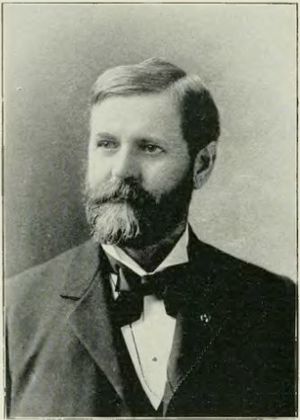John A. T. Hull facts for kids
Quick facts for kids
John Albert Tiffin Hull
|
|
|---|---|
 |
|
| Secretary of State of Iowa | |
| In office 1879–1885 |
|
| Governor | John H. Gear Buren R. Sherman |
| Preceded by | Josiah T. Young |
| Succeeded by | Frank D. Jackson |
| Lieutenant Governor of Iowa | |
| In office 1886–1890 |
|
| Governor | William Larrabee |
| Preceded by | Orlando H. Manning |
| Succeeded by | Alfred N. Poyneer |
| Member of the U.S. House of Representatives from Iowa's 7th district |
|
| In office March 4, 1891 – March 3, 1911 |
|
| Preceded by | Edward R. Hays |
| Succeeded by | Solomon F. Prouty |
| Personal details | |
| Born | May 1, 1841 Sabina, Ohio, U.S. |
| Died | September 26, 1928 (aged 87) Clarendon, Virginia, U.S. |
| Resting place | Arlington National Cemetery |
| Political party | Republican |
| Children | John A. Hull |
John Albert Tiffin Hull (born May 1, 1841 – died September 26, 1928) was an important American politician from Iowa. He served for many years in the U.S. House of Representatives, which is part of the U.S. Congress. Before that, he held several key positions in Iowa, including Lieutenant Governor and Secretary of State. He dedicated much of his life to public service.
Contents
A Life of Public Service
Early Life and Education
John Hull was born in Sabina, Ohio, in 1841. When he was eight years old, his family moved to Iowa. He went to public schools and later attended college at DePauw University in Indiana and Iowa Wesleyan College. In 1862, he graduated from Cincinnati Law School and became a lawyer, starting his practice in Des Moines, Iowa.
Service During the Civil War
In July 1862, during the American Civil War, John Hull joined the Twenty-third Regiment of the Iowa Volunteer Infantry. He served as a first lieutenant and then as a captain. He had to leave the army in October 1863 because of injuries he received.
Early Political Career in Iowa
After his military service, Hull worked in farming and banking. He began his political career by being elected Secretary of the Iowa Senate in 1872. He was reelected to this role three more times, serving until 1878.
Then, he was elected Iowa Secretary of State in 1878 and served three terms. Following this, he became Lieutenant Governor of Iowa in 1885 and was reelected in 1887. These roles helped him gain experience in state government.
Serving in the U.S. Congress
In 1890, John Hull was elected as a Republican to the U.S. House of Representatives. He represented Iowa's 7th congressional district, which included Des Moines, Iowa's largest city. He was reelected nine times, serving a total of ten terms in Congress.
During his time in Congress, he became a very influential leader. He served as the chairman of the House Committee on Military Affairs for many years. This committee deals with important issues related to the military. He was known for supporting the policies of the powerful House Speaker, Joseph Gurney Cannon.
Later Years
In 1910, John Hull ran for reelection but was defeated in the Republican primary election by Solomon F. Prouty. Even though he lost the primary, he still received the nomination from the Prohibition Party. However, Prouty won the general election. Hull's time in Congress ended on March 3, 1911.
After leaving Congress, Hull returned to practicing law, this time in Washington, D.C.. He retired in 1916. John Hull passed away on September 26, 1928, in Clarendon, Virginia. He was buried with honors at Arlington National Cemetery.
His son, Major General John A. Hull, also had an important career. He served as the top lawyer for the U.S. Army and later became a judge on the Supreme Court of the Philippines.

